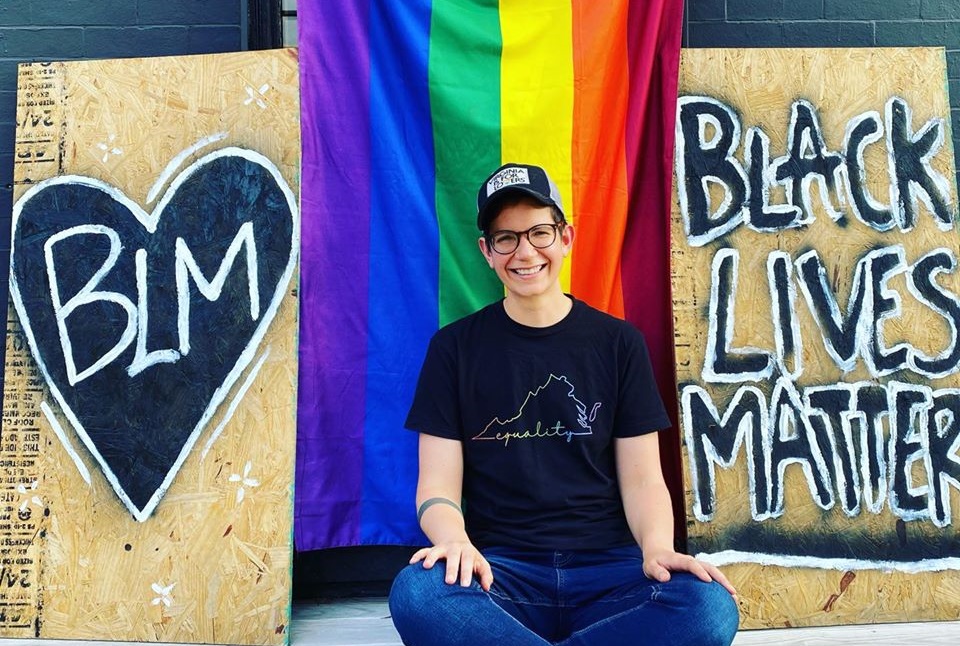Equality Virginia’s Vee Lamneck talks to GayRVA about Title VII, The Virginia Values Act, and the connections between LGBTQ and BLM.
On June 15th, the U.S. Supreme Court reviewed three historic cases and came to one monumental decision: that Title VII of The Civil Rights Act of 1964 protected LGBTQ people from discrimination in the workplace based on their sexual orientation and/or gender identity. Prior to the Title VII decision, it was completely lawful in quite a few states of the union for an employee of a private corporation to be fired or passed up for employment for being LGBTQ.
The Supreme Court made a statement about one of the cases, saying, “Today, we must decide whether an employer can fire someone simply for being homosexual or transgender. The answer is clear. An employer who fires an individual for being homosexual or transgender fires that person for traits or actions it would not have questioned in members of a different sex. Sex plays a necessary and undisguisable role in the decision, exactly what Title VII forbids.” – Supreme Court decision in Bostock v. Clayton County, June 15, 2020.
In many ways, this case was a matter of analyzing the Civil Rights Act through a modern lens and recontextualizing the age-old issue of sex discrimination to address the issues of LGBTQ people. When The Civil Rights Act was originally passed, the legislators responsible for its proposal and approval were almost certainly thinking of women, and not of gay, lesbian, bisexual, and trans people. However, when Title VII was reviewed in today’s context, the justices found that the same laws that protected women from discrimination in ‘60’s should also protect LGBTQ people today.
One of the foremost advocacy groups for LGBTQ rights in Virginia is Equality Virginia, an organization that is dedicated to creating a truly inclusive commonwealth for all Virginians, regardless of sexual orientation and gender identity. Equality Virginia Executive Director Vee Lamneck, who uses they/them pronouns, spoke to us about what this landmark Supreme Court decision means for LGBTQ Richmonders, Virginians, and Americans.
“LGBTQ people have been advocating for their rights for decades,” Lamneck said. “There are many states in the country that have non-discrimination protections in place at the state level, and I am very proud that Virginia is soon to be one of them.”
Lamneck is referring to The Virginia Values Act, which was passed by the General Assembly this spring and takes effect on July 1st. This bill will protect LGBTQ Virginians from discrimination in all public spaces and places of business, not just as employees but as customers and citizens as well.
“This means that LGBTQ people will be able to go about their daily lives without fear of discrimination in housing, in public spaces like restaurants and hotels, and also in employment,” Lamneck continued.

Lamneck explained that the Virginia Values Act goes farther than the recent Supreme Court decision, protecting LGBTQ people beyond the workplace. “The Virginia Values Act speaks to public accommodations protections, so that you cannot be discriminated against or denied service when you walk into a restaurant or shop or hotel on the basis of your orientation or identity,” they said. “Title VII does not speak to that, which is why there’s a lot more work to do on the federal level.”
While Lamneck is very pleased about the protections Virginians are ensured within the Commonwealth, they still consider it very important to focus on federal protections. “Once Virginians leave the Commonwealth and go to other states, depending on which state you’re in, those protections may not be in place,” they said.
The recent Supreme Court decision is important to ensure that LGBTQ people are protected against discrimination throughout the country, but it’s not the only action taking place at the federal level where LGBTQ rights are concerned. Lamneck pointed out that the Equality Act, a bill that would amend the Civil Rights Act to include sexual orientation and gender identity as protected classes throughout, passed the US House Of Representatives in 2019, and is currently under consideration by the US Senate.
“The passage of the Equality Act will ensure comprehensive protections for LGBTQ Americans,” Lamneck explained. And while there’s still hope within the LGBTQ community that it will be passed at some point, the recent Supreme Court decision does offer some much-needed relief. “This decision is so important,” they said, “especially for those individuals and their families living in states without these protections.”
Aurora Higgs, a 29 year old black transgender woman who is an LGBTQ scholar, activist, and public speaker, has worked with Lamneck and Equality Virginia on campaigns for LGBTQ equality in Virginia. Higgs is very happy to see the Virginia Values Act go into effect later this week, mentioning that previous laws intended to provide protections for LGBTQ Virginians, none of which passed, had all included disappointing limitations. “This law is so much more comprehensive and covers all of the people in the rural areas that are always going to be the most at risk,” Higgs said.
Despite living in a state that now has protections for LGBTQ people against employment discrimination, Higgs was still glad to hear about the Title VII Supreme Court decision. “It will ensure that the same protections that I enjoy in a state that already has those laws in place can be experienced anywhere in this country,” Higgs said. “Traveling for queer and trans people is incredibly daunting, because you never know what the climate of a community is until you’re in it.”
Higgs shared how she in particular has faced real concerns about discrimination in employment over the course of her life — concerns that she hopes will be diminished by the passage of the Virginia Values Act and the recent Supreme Court decision. “It’s really difficult to enforce discrimination policies in a job interview when there are so many factors that they could use as pretext to not hire you,” she said. “I worry about showing up for job interviews and being seen as a professional when I’m trans and black.”
Under the Supreme Court’s new Title VII decision, Higgs said, working conditions will improve for LGBTQ Americans in a variety of ways. “Employers will have to have a fire lit under them to ensure that insurance policies are adequate for trans people and that the workplace culture is adequate,” Higgs said. “As happy as I am I see it, [it’s] not so much a victory as getting one more hurdle out of the way to liberation, which is the final goal.”
Both Higgs and Lamneck drew parallels between LGBTQ rights and the Black Lives Matter movement that has recently swept across the nation. Lamneck explained how the human rights effort of the BLM Movement and the nationwide protests have affected the work of Equality Virginia, and how the fight for LGBTQ rights and Racial Equality are connected. They also illuminated how the discrimination and inequality that LGBTQ people are subjected to is compounded by their race. Race is the hidden, implied context of every conversation, every law and every decision. A black LGBTQ person’s struggle for equality is compounded by their blackness — which makes things harder still. “Even with the Title VII decision, black LGBTQ people are still experiencing disproportionate discrimination in their lives.” Lamneck said. “Our laws need to address systemic racism and inequality.”

To Higgs, it’s clear that the goals of the Black Lives Matter movement and the LGBTQ rights movement are fundamentally aligned. “The BLM movement seeks to disrupt not just racism but white supremacy,” Higgs said. “White supremacy has historically been misogynistic, homophobic, and transphobic. All of those thing are still present to this day, and they compound one another.”
However, both Higgs and Lamneck agree that the effects of discrimination are magnified by those who exist within multiple marginalized groups. “My experience as a white queer person and the discrimination that I may experience is going to look different than the discrimination of the black trans person next to me because she is experiencing racism, homophobia, and sexism all at the same time,” Lamneck explained.
“There is so much joy and hardship that comes with being black and trans and queer,” said Higgs. “But when you have different dimensions of diversity and marginalization, they compound on one another.”
Higgs believes that the LGBTQ civil rights movement working alongside the Black Lives Matter movement is an ideal way to enable both groups to better understand and support one another. “Although the [Black Lives Matter] movement highlights black lives, it’s really shedding a light on oppression, and I think we all relate to oppression,” she said. “The fastest way to empathy is shared experience.”
While Lamneck is feeling positive about the recent progress in LGBTQ civil rights, they recognize that there’s still a lot more to be done. “This moment reminds us that, yes, this is a victory for the LGBT movement, but also that the work is not done”, Lamneck said. “We need to work to address systemic racism, homophobia, and transphobia. The work for LGBTQ equality must be interwoven with the work to dismantle systemic racism.”
In the future, Lamneck hopes to not only carry on with Equality Virginia’s current mission of fighting for LGBTQ civil rights in the Commonwealth, but to expand that work to encompass other marginalized groups. “I think our work here as an organization needs to continue to restructure as an anti-racist organization,” they said.
For Higgs, the main focus of civil rights activism in the coming years needs to be to increase political representation by and for marginalized groups. “We don’t have hardly any representation in the federal government,” she said. “The most sustainable solution I can think of is having more queer and trans people of color in both appointments at the state level and as elected officials nationwide. I don’t think we can really hope for anything until we have representation in politics.”
For now, though, LGBTQ people in Virginia can breathe slightly easier, knowing that the Virginia Values Act and the recent Supreme Court decision give them more protections against discrimination than they’ve ever had before.
Top Photo via Equality Virginia/Facebook



